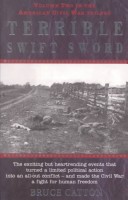American Civil War Trilo
3 total works
This is an eloquent study of the most bitter years of the war when death slashed the country with a brutality unparalleled in the history of the United States. Through the kaleidoscopic tone and temper of the struggle, two men grappled with the burden of being leaders in both politics and war. In the North, Lincoln remained resolute that a house divided against itself could not stand. His vast use of resources is brilliantly contrasted with Jefferson Davis' valiant struggle for political and economic stability in the hopelessly fragmented and underdeveloped South. 'Better than any other history of the Civil War it combines narrative vigour, literary grace, freshness of view and independence of judgement, and a kind of catholic spirit which embraces the whole vast and tumultuous scene' Henry Steele Commager. This book can be read as a self-contained narrative or in sequence with the previous two volumes.
In this thrillingly readable piece of historical writing, Bruce Catton describes the forces which combined to drive the United States apart. Opening with the Democratic Party's Charleston Convention in 1860 and the split which ended with two Democratic candidates for the Presidency; the Republic Convention and the campaign which ended in Lincoln's victory, the book takes its inevitable course to the wave of secession in the South, the firing of the first shots at Fort Sumter, the aligning of forces in the North and South, ending with the first battle of the war at Bull Run. Catton superbly conveys the way the country first drifted, and then was swept, into war. We see Lincoln and Jefferson Davis pitted against each other and the famous generals, Robert E. Lee, fighting for the Confederacy and William T.Sherman lining up with the North.'...a major work by a major writer, a superb re-creation of the twelve crucial months that opened the Civil War' New York Times
This second volume in Bruce Catton's American Civil War trilogy shows how the Union and Confederacy slowly reconciled themselves to all-out war. At the start of this period there was little action as each side reviewed its position and counted its heads and guns. The North had positive advantages (but not one in General McClellan who is impaled forever in this book by extracts from his arrogant letters). The South recognised that it would have to strike hard to win, but it had terrible handicaps (including flintlock rifles which would not fire in the rain). Gradually the action emerged and with it the stature of Lee, Grant, Jefferson Davis and Sherman. And gradually too the civil war changed its nature from an uninspiring police action to a series of bloody clashes in the cause of ending human slavery.

